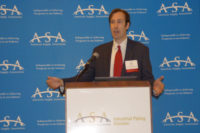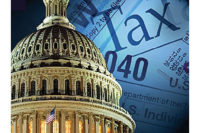When Congress returned from its September recess it’s hard to believe Speaker of the House John Boehner knew what he was planning to do or of the ensuing activity that followed.
Prior to “the decision,” Washington was gearing up for a first-of-its-kind event, an address to Congress by the Pope. Nobody (not even his family) knew Boehner would step down the next day. Publically, he declared his time had come and noted the Pope’s visit was the pinnacle of his career, an achievement more than two decades in the making. Many believe his frustration with an unmanageable and unruly House grew just too big, creating unnecessary gridlock. It’s likely both rang true, but the drama did not end there.
Historically, Republicans practice the philosophy of “next man up.” John McCain came in second to George W. Bush in 2000 and Mitt Romney came in second to McCain in 2008. Little turmoil had been expected, nor opposition to stand in the way of House Majority Leader Kevin McCarthy’s ascendancy to the third-highest office in the nation — except it did. McCarthy’s future as speaker ended before it ever began after he spoke of Secretary Hillary Clinton’s public opinion polls dropping as a result of the creation of the House Select Committee on Benghazi.
McCarthy was challenged by House Government Reform and Oversight Chairman Jason Chaffetz of Utah. Although underreported by Washington media, one of the American Supply Association’s key issues came into focus in the race to see who was more conservative.
Chaffetz is the author of the Remote Transactions Parity Act, which is the most up-to-date version of online fairness legislation that ASA and its members support. McCarthy used this issue and Chaffetz’s support as a wedge to try and point out he was for increasing taxes and that McCarthy was not. It’s definitely not good when the House Majority Leader and presumptive speaker comes out so publically against one of the key priorities of the brick-and-mortar community.
As we all know, after much convincing Wisconsin’s Paul Ryan was elected speaker. A former staffer who worked in the trenches for Jack Kemp, Ryan is a supply-side policy-wonk that chaired two house committees: the Committee on the Budget and until stepping into speakership, the powerful tax-writing Ways and Means Committee. Ryan’s a guy that keeps his cards close to his vest, works late and hits the gym early, a departure from his predecessor. He’s deliberate and choses the right policy, not the most popular or easiest to get through the House.
Prior to his departure, Boehner worked with the White House to hammer out one last deal, an agreement to prevent a debt default through the 2016 elections and set funding caps for the year. This left Congress with the responsibility to fund the federal government for 2016 by Dec. 11.
As of press time, reports stated a wish list of policy riders was being prepared, which is Congress’ way of preventing the federal government from enacting certain laws by explicitly instructing them or withholding funding. Although unlikely to achieve everything, here’s what the Republican wish list includes: block Waters of the United States regulations; overwrite a proposed fiduciary rule that would make brokers legally liable for the investment advice they give to customers; kill the EPA’s clean power plan which Republicans fear will hurt home-state coal companies; and continue to chip away at Obamacare and the Consumer Financial Protection Bureau.
It will be of interest to see what they’re willing to give up and what they’ll fight to the finish for in order to avert a government shutdown — something both sides should want to avoid.





